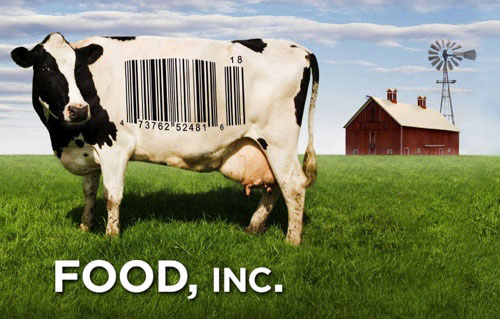
I highly recommend this 2008 documentary. It looks at how aspects of the food industry control what we eat with little concern for its affect on our health or the humane treatment of animals. The film touches on big monopolistic companies like Tyson and Monsanto, examines the world of organic farming, gives glimpses into factory farming, and shows how big food companies carry the same political cloud as the oil, gun, and other lobbies.
This is a documentary where you learn a lot. Here are some things I gleaned:
- We re-engineered the chicken to grow in 49 days, instead of 70.
They now have very large breasts, because people prefer white meat. - The
hamburger you buy in the store may come from hundreds of different cows
slaughtered on factory farms, and there’s a chance that one of those
cows had e coli. This scary argument is presented very convincingly. - In both Republican and Democratic administrations, key position
involved with food regulation and policy are filled by people who once
worked for the food industry–lobbyists, corporate board members,
lawyers, etc. You won’t find ordinary farmers in any position of
influence. - Why can you get a hamburger for a dollar, but you can’ get a head of broccoli for a dollar? It’s because we’ve skewed what we subsidize to the bad calories.
- From an evolutionary standpoint, our bodies are not wired for sugar, salt, and fat. But those dominate our diets.
- God designed cows to eat grass. That’s how their digestive system works best. But most of the beef we buy is corn-fed. The goal is to bulk up cattle quickly. But for corn-fed cattle, you must grow the corn, transport it, then remove the manure–all of which are not environmentally friendly practices. Grass-fed cows, by comparison, graze on the grass and their manure fertilizes it. It’s a complete system in one field, and it saves on gas and transportation costs.
- Most Mexican farmers grew corn. NAFTA flooded Mexico with cheap American corn, and put 1.5 million Mexican farmers out of work.
- The film blasts Monsanto to pieces. Monsanto basically owns everything involving soybeans because they patented a gene in the soybean. Farmers can’t fight them. Monsanto has a big team of investigators who go after farmers in court.
- Wal-Mart was commended for some of their practices and their embrace of organic foods.
- The food industry fights any kind of food labeling requirements. They don’t want you to know what’s in your food, how it was grown, and where.
- The film suggests that the battle against tobacco is the model for how an industry’s irresponsible behavior can be changed.
- Companies that don’t treat animals with respect probably don’t treat workers and the environment–and customers–with respect.
- Buy locally grown food. It doesn’t need to be transported long distances (more eco-friendly), and it probably doesn’t come from factory farms, where animals are warehoused in squalid conditions until they are ready for slaughter.





